An Analysis of Operations, Logistics & Supply Chain Management in NHS
VerifiedAdded on 2021/02/22
|9
|3109
|135
Report
AI Summary
This report provides an in-depth analysis of operations, logistics, and supply chain management within Imperial College Healthcare NHS. It begins with an introduction to operations, logistics, and supply chain management, highlighting their importance in transforming raw resources into finished goods and managing the flow of products and materials. The report then provides an overview of Imperial College Healthcare NHS, discussing its structure, services, and financial performance. The core of the report focuses on managing quality, including discussions of Theory X and Theory Y in managing people, and the application of Total Quality Management (TQM) principles, such as Ishikawa's, Deming's, and Juran's theories. The report also explores the economic, environmental, and social considerations that influence NHS operations, particularly the impact of social factors. Overall, the report provides a comprehensive understanding of the challenges and strategies involved in managing operations, logistics, and supply chains within a complex healthcare environment.
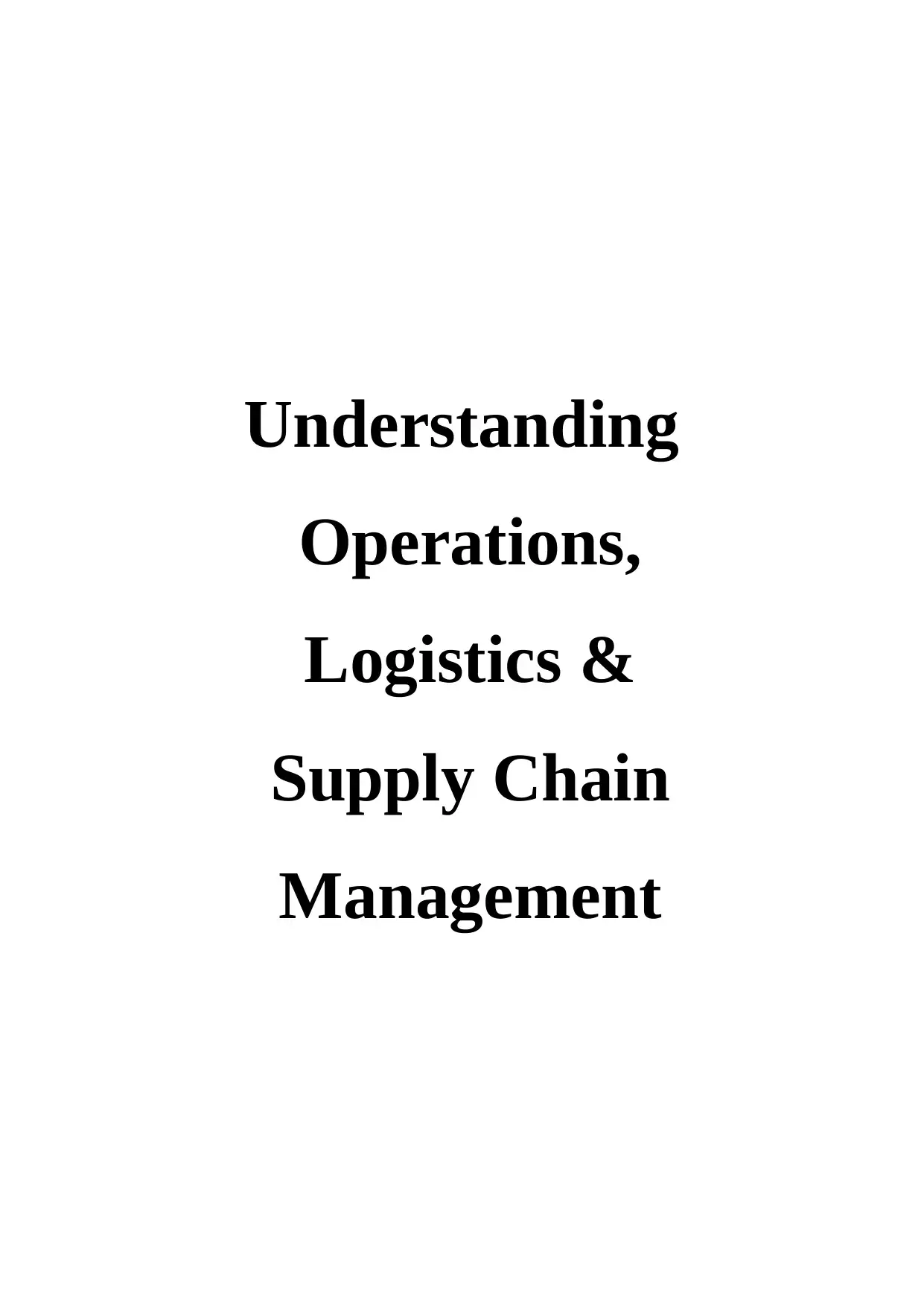
Understanding
Operations,
Logistics &
Supply Chain
Management
Operations,
Logistics &
Supply Chain
Management
Paraphrase This Document
Need a fresh take? Get an instant paraphrase of this document with our AI Paraphraser
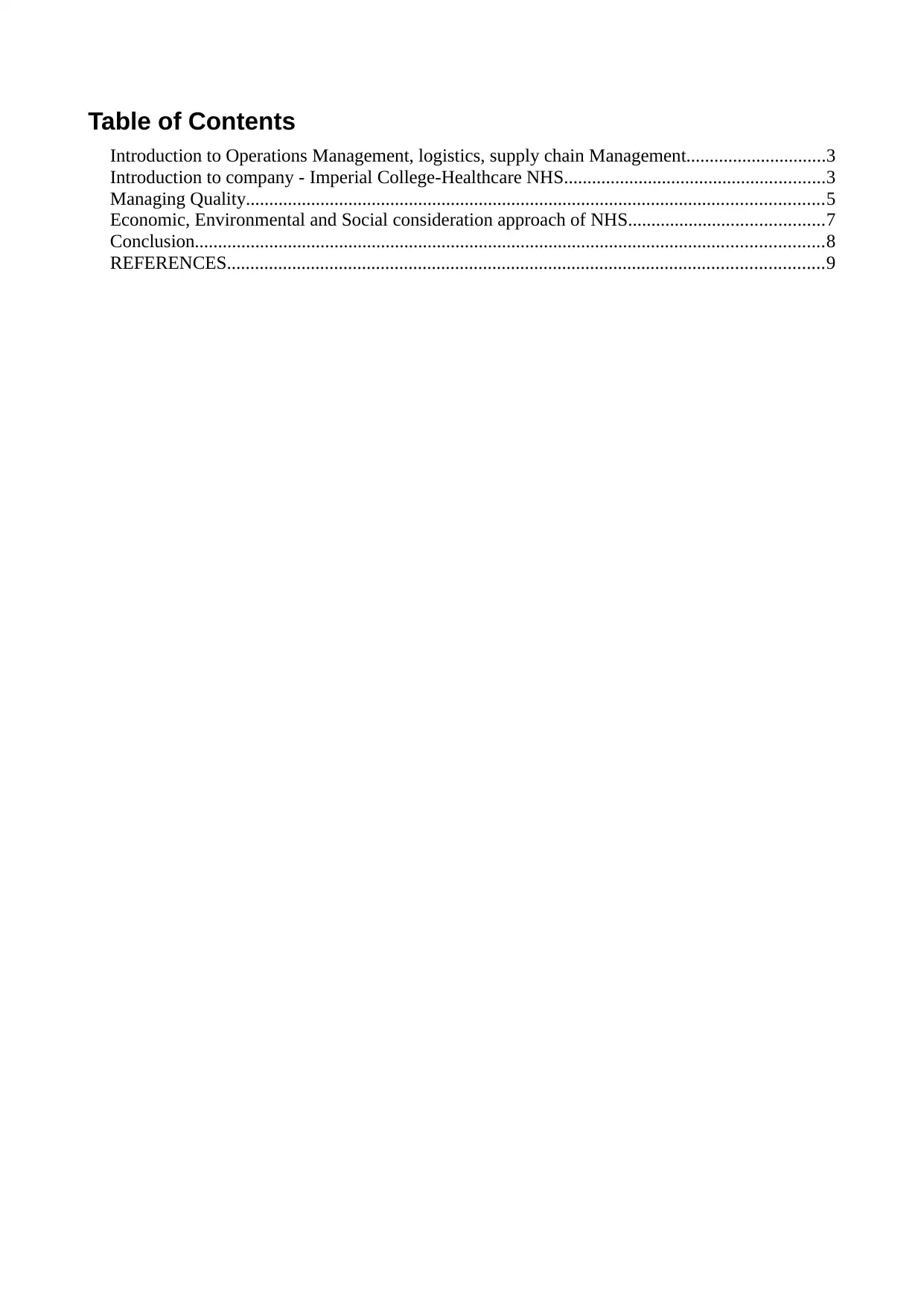
Table of Contents
Introduction to Operations Management, logistics, supply chain Management..............................3
Introduction to company - Imperial College-Healthcare NHS........................................................3
Managing Quality............................................................................................................................5
Economic, Environmental and Social consideration approach of NHS..........................................7
Conclusion.......................................................................................................................................8
REFERENCES................................................................................................................................9
Introduction to Operations Management, logistics, supply chain Management..............................3
Introduction to company - Imperial College-Healthcare NHS........................................................3
Managing Quality............................................................................................................................5
Economic, Environmental and Social consideration approach of NHS..........................................7
Conclusion.......................................................................................................................................8
REFERENCES................................................................................................................................9
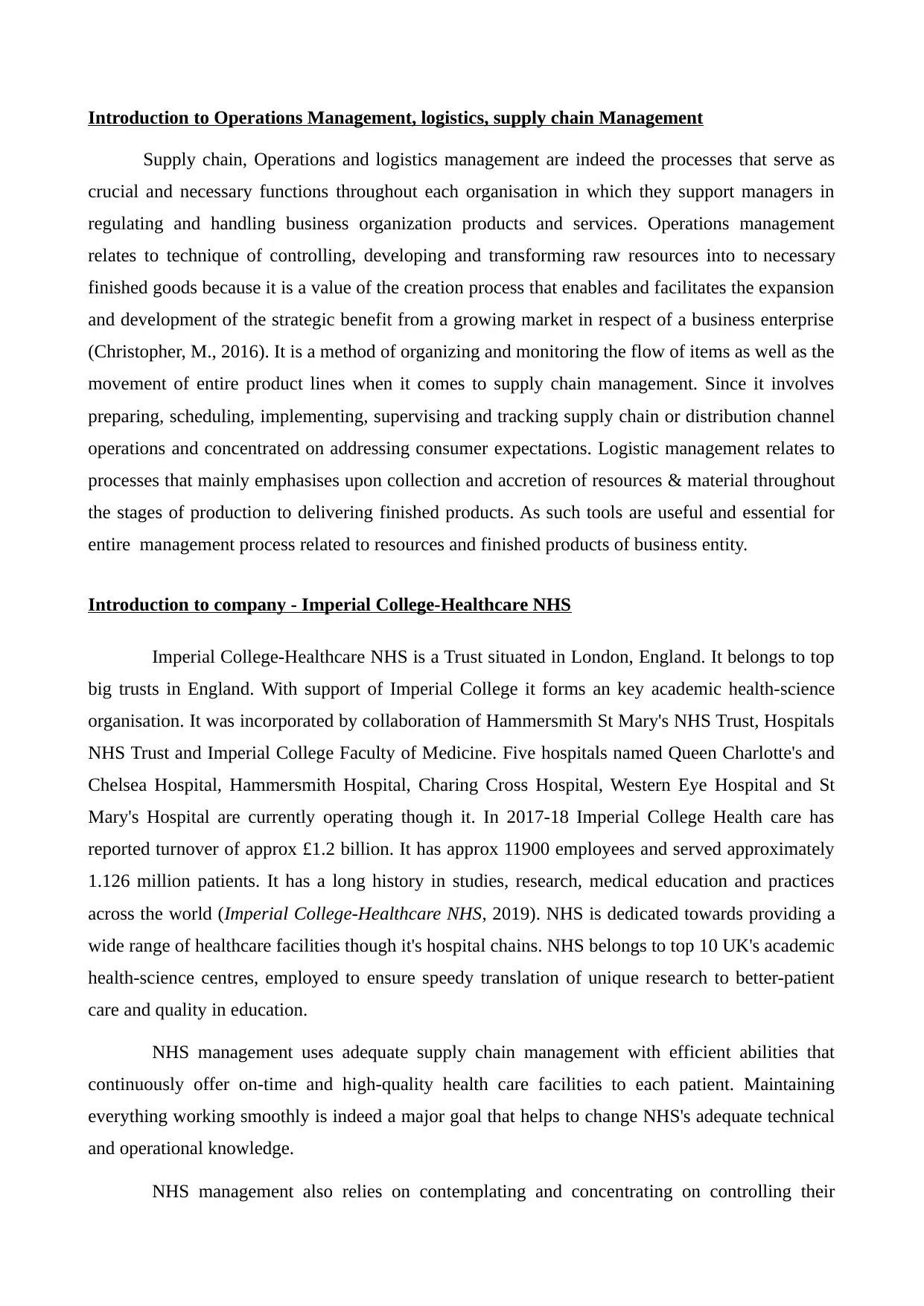
Introduction to Operations Management, logistics, supply chain Management
Supply chain, Operations and logistics management are indeed the processes that serve as
crucial and necessary functions throughout each organisation in which they support managers in
regulating and handling business organization products and services. Operations management
relates to technique of controlling, developing and transforming raw resources into to necessary
finished goods because it is a value of the creation process that enables and facilitates the expansion
and development of the strategic benefit from a growing market in respect of a business enterprise
(Christopher, M., 2016). It is a method of organizing and monitoring the flow of items as well as the
movement of entire product lines when it comes to supply chain management. Since it involves
preparing, scheduling, implementing, supervising and tracking supply chain or distribution channel
operations and concentrated on addressing consumer expectations. Logistic management relates to
processes that mainly emphasises upon collection and accretion of resources & material throughout
the stages of production to delivering finished products. As such tools are useful and essential for
entire management process related to resources and finished products of business entity.
Introduction to company - Imperial College-Healthcare NHS
Imperial College-Healthcare NHS is a Trust situated in London, England. It belongs to top
big trusts in England. With support of Imperial College it forms an key academic health-science
organisation. It was incorporated by collaboration of Hammersmith St Mary's NHS Trust, Hospitals
NHS Trust and Imperial College Faculty of Medicine. Five hospitals named Queen Charlotte's and
Chelsea Hospital, Hammersmith Hospital, Charing Cross Hospital, Western Eye Hospital and St
Mary's Hospital are currently operating though it. In 2017-18 Imperial College Health care has
reported turnover of approx £1.2 billion. It has approx 11900 employees and served approximately
1.126 million patients. It has a long history in studies, research, medical education and practices
across the world (Imperial College-Healthcare NHS, 2019). NHS is dedicated towards providing a
wide range of healthcare facilities though it's hospital chains. NHS belongs to top 10 UK's academic
health-science centres, employed to ensure speedy translation of unique research to better-patient
care and quality in education.
NHS management uses adequate supply chain management with efficient abilities that
continuously offer on-time and high-quality health care facilities to each patient. Maintaining
everything working smoothly is indeed a major goal that helps to change NHS's adequate technical
and operational knowledge.
NHS management also relies on contemplating and concentrating on controlling their
Supply chain, Operations and logistics management are indeed the processes that serve as
crucial and necessary functions throughout each organisation in which they support managers in
regulating and handling business organization products and services. Operations management
relates to technique of controlling, developing and transforming raw resources into to necessary
finished goods because it is a value of the creation process that enables and facilitates the expansion
and development of the strategic benefit from a growing market in respect of a business enterprise
(Christopher, M., 2016). It is a method of organizing and monitoring the flow of items as well as the
movement of entire product lines when it comes to supply chain management. Since it involves
preparing, scheduling, implementing, supervising and tracking supply chain or distribution channel
operations and concentrated on addressing consumer expectations. Logistic management relates to
processes that mainly emphasises upon collection and accretion of resources & material throughout
the stages of production to delivering finished products. As such tools are useful and essential for
entire management process related to resources and finished products of business entity.
Introduction to company - Imperial College-Healthcare NHS
Imperial College-Healthcare NHS is a Trust situated in London, England. It belongs to top
big trusts in England. With support of Imperial College it forms an key academic health-science
organisation. It was incorporated by collaboration of Hammersmith St Mary's NHS Trust, Hospitals
NHS Trust and Imperial College Faculty of Medicine. Five hospitals named Queen Charlotte's and
Chelsea Hospital, Hammersmith Hospital, Charing Cross Hospital, Western Eye Hospital and St
Mary's Hospital are currently operating though it. In 2017-18 Imperial College Health care has
reported turnover of approx £1.2 billion. It has approx 11900 employees and served approximately
1.126 million patients. It has a long history in studies, research, medical education and practices
across the world (Imperial College-Healthcare NHS, 2019). NHS is dedicated towards providing a
wide range of healthcare facilities though it's hospital chains. NHS belongs to top 10 UK's academic
health-science centres, employed to ensure speedy translation of unique research to better-patient
care and quality in education.
NHS management uses adequate supply chain management with efficient abilities that
continuously offer on-time and high-quality health care facilities to each patient. Maintaining
everything working smoothly is indeed a major goal that helps to change NHS's adequate technical
and operational knowledge.
NHS management also relies on contemplating and concentrating on controlling their
⊘ This is a preview!⊘
Do you want full access?
Subscribe today to unlock all pages.

Trusted by 1+ million students worldwide
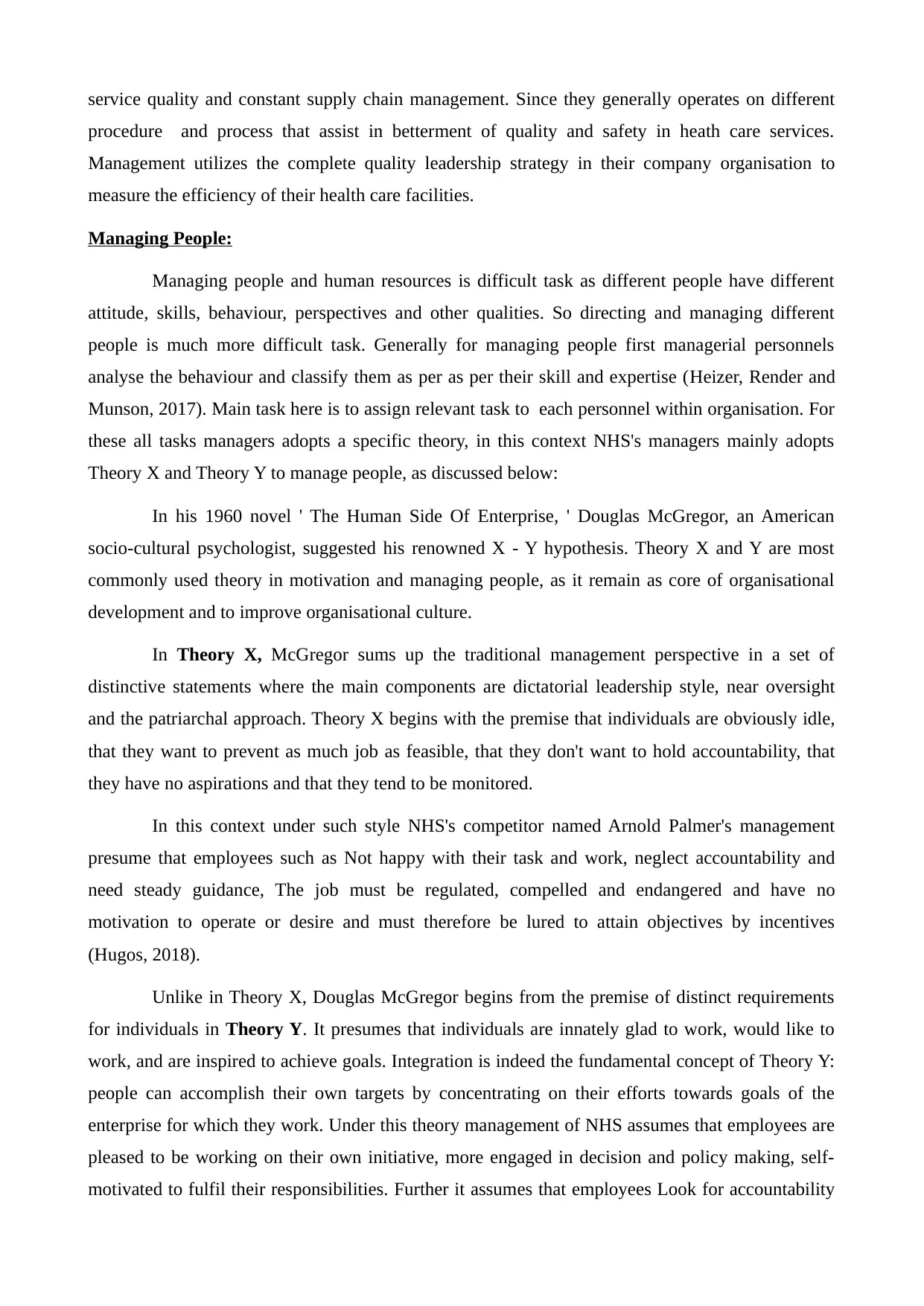
service quality and constant supply chain management. Since they generally operates on different
procedure and process that assist in betterment of quality and safety in heath care services.
Management utilizes the complete quality leadership strategy in their company organisation to
measure the efficiency of their health care facilities.
Managing People:
Managing people and human resources is difficult task as different people have different
attitude, skills, behaviour, perspectives and other qualities. So directing and managing different
people is much more difficult task. Generally for managing people first managerial personnels
analyse the behaviour and classify them as per as per their skill and expertise (Heizer, Render and
Munson, 2017). Main task here is to assign relevant task to each personnel within organisation. For
these all tasks managers adopts a specific theory, in this context NHS's managers mainly adopts
Theory X and Theory Y to manage people, as discussed below:
In his 1960 novel ' The Human Side Of Enterprise, ' Douglas McGregor, an American
socio-cultural psychologist, suggested his renowned X - Y hypothesis. Theory X and Y are most
commonly used theory in motivation and managing people, as it remain as core of organisational
development and to improve organisational culture.
In Theory X, McGregor sums up the traditional management perspective in a set of
distinctive statements where the main components are dictatorial leadership style, near oversight
and the patriarchal approach. Theory X begins with the premise that individuals are obviously idle,
that they want to prevent as much job as feasible, that they don't want to hold accountability, that
they have no aspirations and that they tend to be monitored.
In this context under such style NHS's competitor named Arnold Palmer's management
presume that employees such as Not happy with their task and work, neglect accountability and
need steady guidance, The job must be regulated, compelled and endangered and have no
motivation to operate or desire and must therefore be lured to attain objectives by incentives
(Hugos, 2018).
Unlike in Theory X, Douglas McGregor begins from the premise of distinct requirements
for individuals in Theory Y. It presumes that individuals are innately glad to work, would like to
work, and are inspired to achieve goals. Integration is indeed the fundamental concept of Theory Y:
people can accomplish their own targets by concentrating on their efforts towards goals of the
enterprise for which they work. Under this theory management of NHS assumes that employees are
pleased to be working on their own initiative, more engaged in decision and policy making, self-
motivated to fulfil their responsibilities. Further it assumes that employees Look for accountability
procedure and process that assist in betterment of quality and safety in heath care services.
Management utilizes the complete quality leadership strategy in their company organisation to
measure the efficiency of their health care facilities.
Managing People:
Managing people and human resources is difficult task as different people have different
attitude, skills, behaviour, perspectives and other qualities. So directing and managing different
people is much more difficult task. Generally for managing people first managerial personnels
analyse the behaviour and classify them as per as per their skill and expertise (Heizer, Render and
Munson, 2017). Main task here is to assign relevant task to each personnel within organisation. For
these all tasks managers adopts a specific theory, in this context NHS's managers mainly adopts
Theory X and Theory Y to manage people, as discussed below:
In his 1960 novel ' The Human Side Of Enterprise, ' Douglas McGregor, an American
socio-cultural psychologist, suggested his renowned X - Y hypothesis. Theory X and Y are most
commonly used theory in motivation and managing people, as it remain as core of organisational
development and to improve organisational culture.
In Theory X, McGregor sums up the traditional management perspective in a set of
distinctive statements where the main components are dictatorial leadership style, near oversight
and the patriarchal approach. Theory X begins with the premise that individuals are obviously idle,
that they want to prevent as much job as feasible, that they don't want to hold accountability, that
they have no aspirations and that they tend to be monitored.
In this context under such style NHS's competitor named Arnold Palmer's management
presume that employees such as Not happy with their task and work, neglect accountability and
need steady guidance, The job must be regulated, compelled and endangered and have no
motivation to operate or desire and must therefore be lured to attain objectives by incentives
(Hugos, 2018).
Unlike in Theory X, Douglas McGregor begins from the premise of distinct requirements
for individuals in Theory Y. It presumes that individuals are innately glad to work, would like to
work, and are inspired to achieve goals. Integration is indeed the fundamental concept of Theory Y:
people can accomplish their own targets by concentrating on their efforts towards goals of the
enterprise for which they work. Under this theory management of NHS assumes that employees are
pleased to be working on their own initiative, more engaged in decision and policy making, self-
motivated to fulfil their responsibilities. Further it assumes that employees Look for accountability
Paraphrase This Document
Need a fresh take? Get an instant paraphrase of this document with our AI Paraphraser
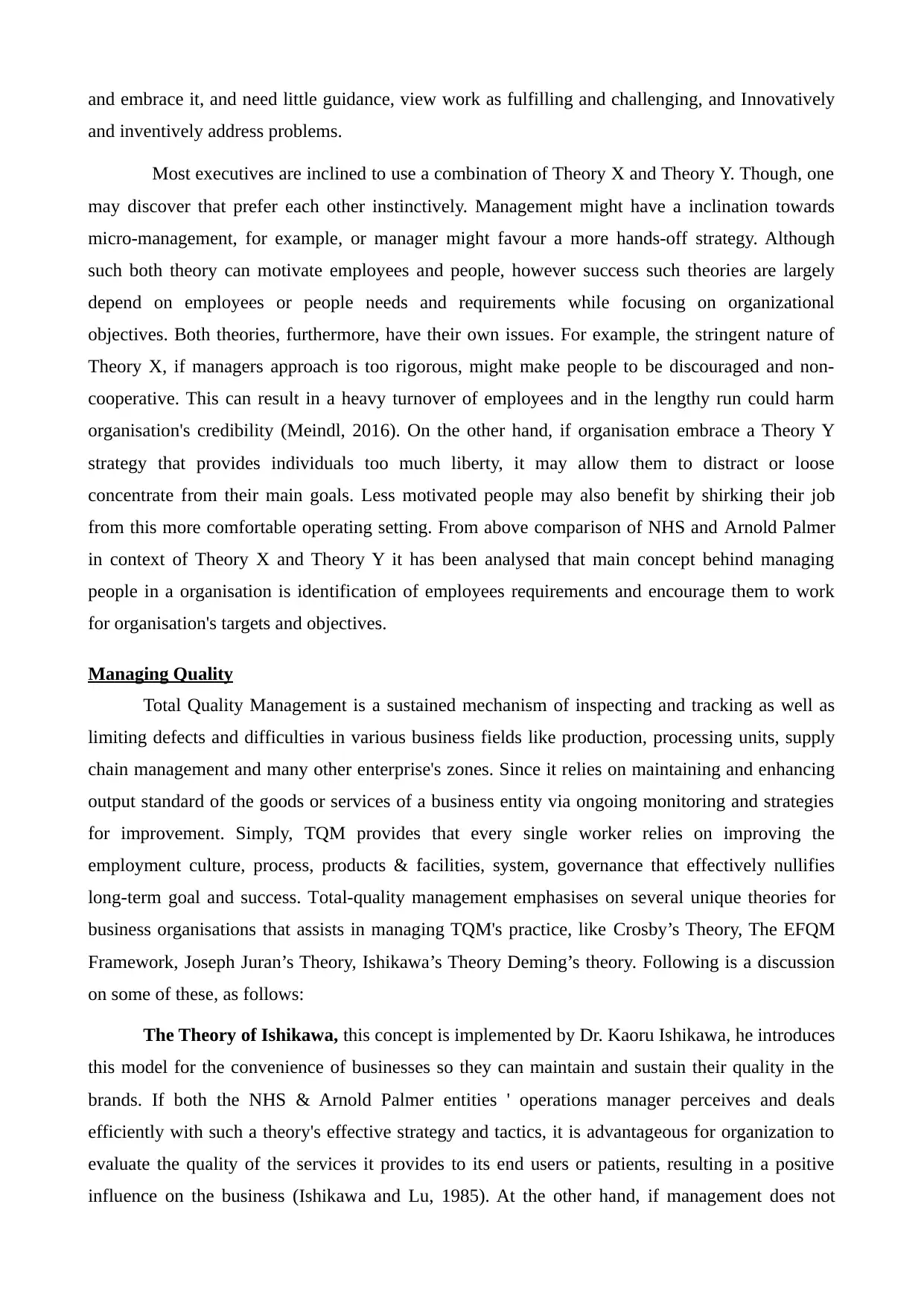
and embrace it, and need little guidance, view work as fulfilling and challenging, and Innovatively
and inventively address problems.
Most executives are inclined to use a combination of Theory X and Theory Y. Though, one
may discover that prefer each other instinctively. Management might have a inclination towards
micro-management, for example, or manager might favour a more hands-off strategy. Although
such both theory can motivate employees and people, however success such theories are largely
depend on employees or people needs and requirements while focusing on organizational
objectives. Both theories, furthermore, have their own issues. For example, the stringent nature of
Theory X, if managers approach is too rigorous, might make people to be discouraged and non-
cooperative. This can result in a heavy turnover of employees and in the lengthy run could harm
organisation's credibility (Meindl, 2016). On the other hand, if organisation embrace a Theory Y
strategy that provides individuals too much liberty, it may allow them to distract or loose
concentrate from their main goals. Less motivated people may also benefit by shirking their job
from this more comfortable operating setting. From above comparison of NHS and Arnold Palmer
in context of Theory X and Theory Y it has been analysed that main concept behind managing
people in a organisation is identification of employees requirements and encourage them to work
for organisation's targets and objectives.
Managing Quality
Total Quality Management is a sustained mechanism of inspecting and tracking as well as
limiting defects and difficulties in various business fields like production, processing units, supply
chain management and many other enterprise's zones. Since it relies on maintaining and enhancing
output standard of the goods or services of a business entity via ongoing monitoring and strategies
for improvement. Simply, TQM provides that every single worker relies on improving the
employment culture, process, products & facilities, system, governance that effectively nullifies
long-term goal and success. Total-quality management emphasises on several unique theories for
business organisations that assists in managing TQM's practice, like Crosby’s Theory, The EFQM
Framework, Joseph Juran’s Theory, Ishikawa’s Theory Deming’s theory. Following is a discussion
on some of these, as follows:
The Theory of Ishikawa, this concept is implemented by Dr. Kaoru Ishikawa, he introduces
this model for the convenience of businesses so they can maintain and sustain their quality in the
brands. If both the NHS & Arnold Palmer entities ' operations manager perceives and deals
efficiently with such a theory's effective strategy and tactics, it is advantageous for organization to
evaluate the quality of the services it provides to its end users or patients, resulting in a positive
influence on the business (Ishikawa and Lu, 1985). At the other hand, if management does not
and inventively address problems.
Most executives are inclined to use a combination of Theory X and Theory Y. Though, one
may discover that prefer each other instinctively. Management might have a inclination towards
micro-management, for example, or manager might favour a more hands-off strategy. Although
such both theory can motivate employees and people, however success such theories are largely
depend on employees or people needs and requirements while focusing on organizational
objectives. Both theories, furthermore, have their own issues. For example, the stringent nature of
Theory X, if managers approach is too rigorous, might make people to be discouraged and non-
cooperative. This can result in a heavy turnover of employees and in the lengthy run could harm
organisation's credibility (Meindl, 2016). On the other hand, if organisation embrace a Theory Y
strategy that provides individuals too much liberty, it may allow them to distract or loose
concentrate from their main goals. Less motivated people may also benefit by shirking their job
from this more comfortable operating setting. From above comparison of NHS and Arnold Palmer
in context of Theory X and Theory Y it has been analysed that main concept behind managing
people in a organisation is identification of employees requirements and encourage them to work
for organisation's targets and objectives.
Managing Quality
Total Quality Management is a sustained mechanism of inspecting and tracking as well as
limiting defects and difficulties in various business fields like production, processing units, supply
chain management and many other enterprise's zones. Since it relies on maintaining and enhancing
output standard of the goods or services of a business entity via ongoing monitoring and strategies
for improvement. Simply, TQM provides that every single worker relies on improving the
employment culture, process, products & facilities, system, governance that effectively nullifies
long-term goal and success. Total-quality management emphasises on several unique theories for
business organisations that assists in managing TQM's practice, like Crosby’s Theory, The EFQM
Framework, Joseph Juran’s Theory, Ishikawa’s Theory Deming’s theory. Following is a discussion
on some of these, as follows:
The Theory of Ishikawa, this concept is implemented by Dr. Kaoru Ishikawa, he introduces
this model for the convenience of businesses so they can maintain and sustain their quality in the
brands. If both the NHS & Arnold Palmer entities ' operations manager perceives and deals
efficiently with such a theory's effective strategy and tactics, it is advantageous for organization to
evaluate the quality of the services it provides to its end users or patients, resulting in a positive
influence on the business (Ishikawa and Lu, 1985). At the other hand, if management does not
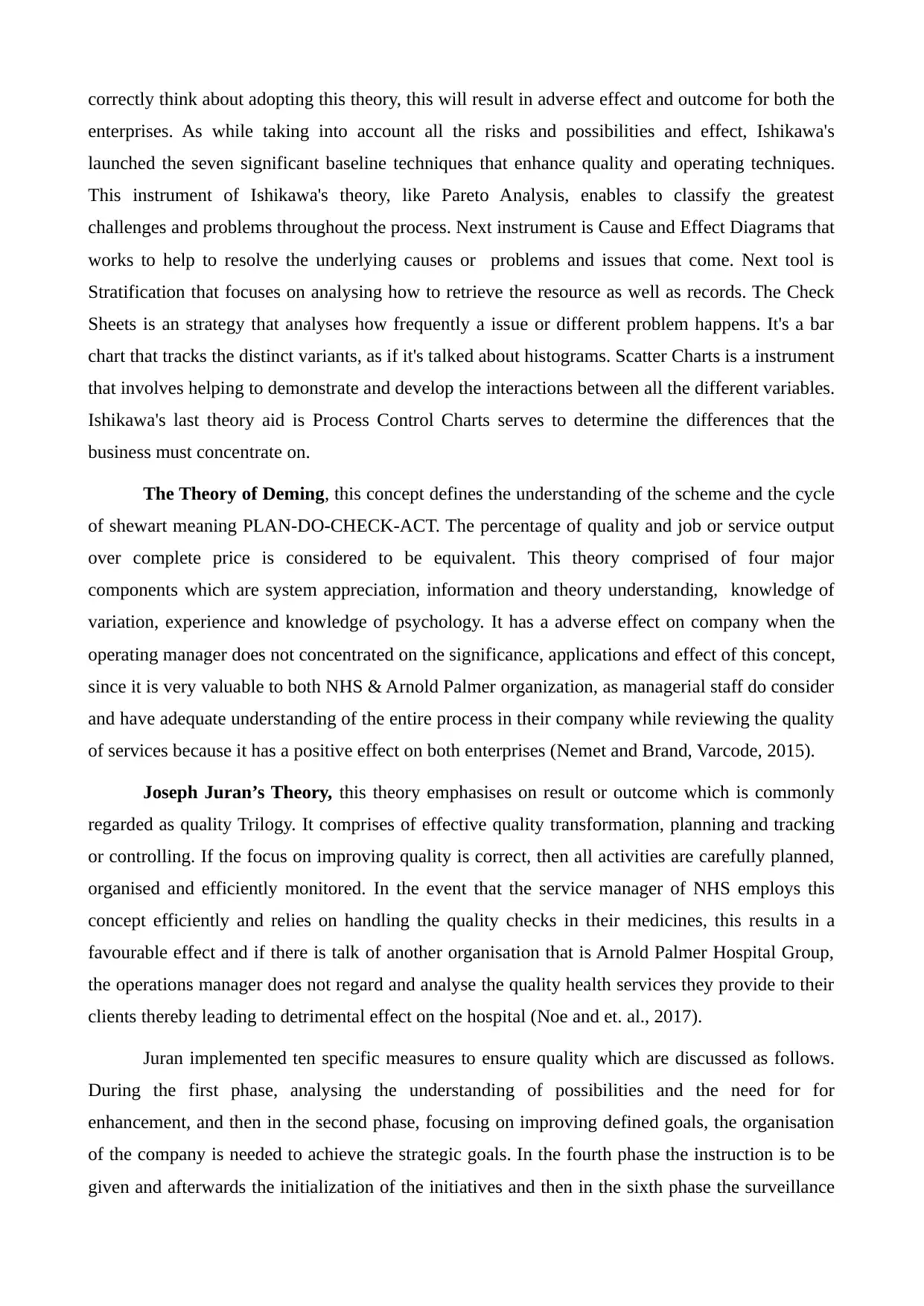
correctly think about adopting this theory, this will result in adverse effect and outcome for both the
enterprises. As while taking into account all the risks and possibilities and effect, Ishikawa's
launched the seven significant baseline techniques that enhance quality and operating techniques.
This instrument of Ishikawa's theory, like Pareto Analysis, enables to classify the greatest
challenges and problems throughout the process. Next instrument is Cause and Effect Diagrams that
works to help to resolve the underlying causes or problems and issues that come. Next tool is
Stratification that focuses on analysing how to retrieve the resource as well as records. The Check
Sheets is an strategy that analyses how frequently a issue or different problem happens. It's a bar
chart that tracks the distinct variants, as if it's talked about histograms. Scatter Charts is a instrument
that involves helping to demonstrate and develop the interactions between all the different variables.
Ishikawa's last theory aid is Process Control Charts serves to determine the differences that the
business must concentrate on.
The Theory of Deming, this concept defines the understanding of the scheme and the cycle
of shewart meaning PLAN-DO-CHECK-ACT. The percentage of quality and job or service output
over complete price is considered to be equivalent. This theory comprised of four major
components which are system appreciation, information and theory understanding, knowledge of
variation, experience and knowledge of psychology. It has a adverse effect on company when the
operating manager does not concentrated on the significance, applications and effect of this concept,
since it is very valuable to both NHS & Arnold Palmer organization, as managerial staff do consider
and have adequate understanding of the entire process in their company while reviewing the quality
of services because it has a positive effect on both enterprises (Nemet and Brand, Varcode, 2015).
Joseph Juran’s Theory, this theory emphasises on result or outcome which is commonly
regarded as quality Trilogy. It comprises of effective quality transformation, planning and tracking
or controlling. If the focus on improving quality is correct, then all activities are carefully planned,
organised and efficiently monitored. In the event that the service manager of NHS employs this
concept efficiently and relies on handling the quality checks in their medicines, this results in a
favourable effect and if there is talk of another organisation that is Arnold Palmer Hospital Group,
the operations manager does not regard and analyse the quality health services they provide to their
clients thereby leading to detrimental effect on the hospital (Noe and et. al., 2017).
Juran implemented ten specific measures to ensure quality which are discussed as follows.
During the first phase, analysing the understanding of possibilities and the need for for
enhancement, and then in the second phase, focusing on improving defined goals, the organisation
of the company is needed to achieve the strategic goals. In the fourth phase the instruction is to be
given and afterwards the initialization of the initiatives and then in the sixth phase the surveillance
enterprises. As while taking into account all the risks and possibilities and effect, Ishikawa's
launched the seven significant baseline techniques that enhance quality and operating techniques.
This instrument of Ishikawa's theory, like Pareto Analysis, enables to classify the greatest
challenges and problems throughout the process. Next instrument is Cause and Effect Diagrams that
works to help to resolve the underlying causes or problems and issues that come. Next tool is
Stratification that focuses on analysing how to retrieve the resource as well as records. The Check
Sheets is an strategy that analyses how frequently a issue or different problem happens. It's a bar
chart that tracks the distinct variants, as if it's talked about histograms. Scatter Charts is a instrument
that involves helping to demonstrate and develop the interactions between all the different variables.
Ishikawa's last theory aid is Process Control Charts serves to determine the differences that the
business must concentrate on.
The Theory of Deming, this concept defines the understanding of the scheme and the cycle
of shewart meaning PLAN-DO-CHECK-ACT. The percentage of quality and job or service output
over complete price is considered to be equivalent. This theory comprised of four major
components which are system appreciation, information and theory understanding, knowledge of
variation, experience and knowledge of psychology. It has a adverse effect on company when the
operating manager does not concentrated on the significance, applications and effect of this concept,
since it is very valuable to both NHS & Arnold Palmer organization, as managerial staff do consider
and have adequate understanding of the entire process in their company while reviewing the quality
of services because it has a positive effect on both enterprises (Nemet and Brand, Varcode, 2015).
Joseph Juran’s Theory, this theory emphasises on result or outcome which is commonly
regarded as quality Trilogy. It comprises of effective quality transformation, planning and tracking
or controlling. If the focus on improving quality is correct, then all activities are carefully planned,
organised and efficiently monitored. In the event that the service manager of NHS employs this
concept efficiently and relies on handling the quality checks in their medicines, this results in a
favourable effect and if there is talk of another organisation that is Arnold Palmer Hospital Group,
the operations manager does not regard and analyse the quality health services they provide to their
clients thereby leading to detrimental effect on the hospital (Noe and et. al., 2017).
Juran implemented ten specific measures to ensure quality which are discussed as follows.
During the first phase, analysing the understanding of possibilities and the need for for
enhancement, and then in the second phase, focusing on improving defined goals, the organisation
of the company is needed to achieve the strategic goals. In the fourth phase the instruction is to be
given and afterwards the initialization of the initiatives and then in the sixth phase the surveillance
⊘ This is a preview!⊘
Do you want full access?
Subscribe today to unlock all pages.

Trusted by 1+ million students worldwide
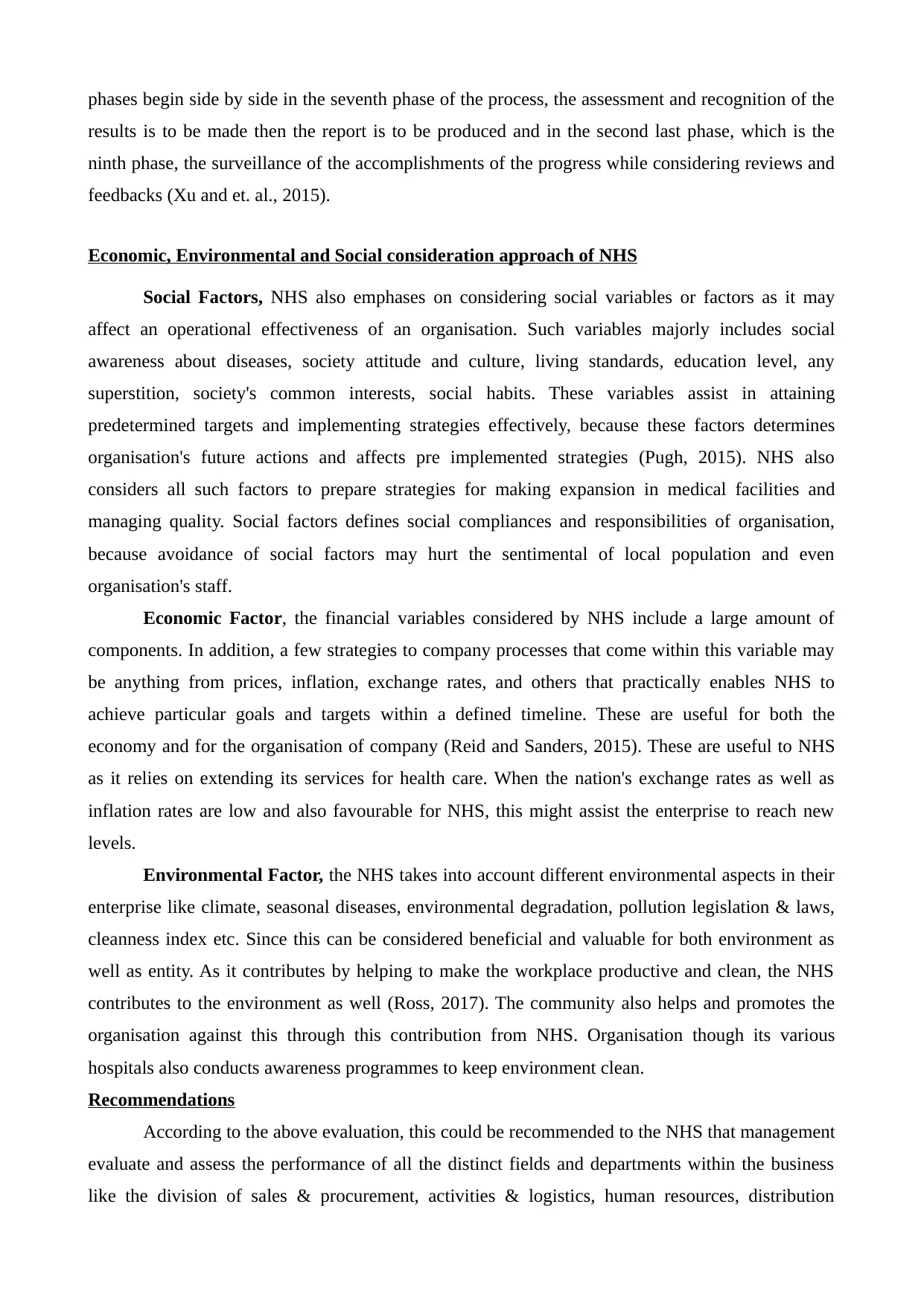
phases begin side by side in the seventh phase of the process, the assessment and recognition of the
results is to be made then the report is to be produced and in the second last phase, which is the
ninth phase, the surveillance of the accomplishments of the progress while considering reviews and
feedbacks (Xu and et. al., 2015).
Economic, Environmental and Social consideration approach of NHS
Social Factors, NHS also emphases on considering social variables or factors as it may
affect an operational effectiveness of an organisation. Such variables majorly includes social
awareness about diseases, society attitude and culture, living standards, education level, any
superstition, society's common interests, social habits. These variables assist in attaining
predetermined targets and implementing strategies effectively, because these factors determines
organisation's future actions and affects pre implemented strategies (Pugh, 2015). NHS also
considers all such factors to prepare strategies for making expansion in medical facilities and
managing quality. Social factors defines social compliances and responsibilities of organisation,
because avoidance of social factors may hurt the sentimental of local population and even
organisation's staff.
Economic Factor, the financial variables considered by NHS include a large amount of
components. In addition, a few strategies to company processes that come within this variable may
be anything from prices, inflation, exchange rates, and others that practically enables NHS to
achieve particular goals and targets within a defined timeline. These are useful for both the
economy and for the organisation of company (Reid and Sanders, 2015). These are useful to NHS
as it relies on extending its services for health care. When the nation's exchange rates as well as
inflation rates are low and also favourable for NHS, this might assist the enterprise to reach new
levels.
Environmental Factor, the NHS takes into account different environmental aspects in their
enterprise like climate, seasonal diseases, environmental degradation, pollution legislation & laws,
cleanness index etc. Since this can be considered beneficial and valuable for both environment as
well as entity. As it contributes by helping to make the workplace productive and clean, the NHS
contributes to the environment as well (Ross, 2017). The community also helps and promotes the
organisation against this through this contribution from NHS. Organisation though its various
hospitals also conducts awareness programmes to keep environment clean.
Recommendations
According to the above evaluation, this could be recommended to the NHS that management
evaluate and assess the performance of all the distinct fields and departments within the business
like the division of sales & procurement, activities & logistics, human resources, distribution
results is to be made then the report is to be produced and in the second last phase, which is the
ninth phase, the surveillance of the accomplishments of the progress while considering reviews and
feedbacks (Xu and et. al., 2015).
Economic, Environmental and Social consideration approach of NHS
Social Factors, NHS also emphases on considering social variables or factors as it may
affect an operational effectiveness of an organisation. Such variables majorly includes social
awareness about diseases, society attitude and culture, living standards, education level, any
superstition, society's common interests, social habits. These variables assist in attaining
predetermined targets and implementing strategies effectively, because these factors determines
organisation's future actions and affects pre implemented strategies (Pugh, 2015). NHS also
considers all such factors to prepare strategies for making expansion in medical facilities and
managing quality. Social factors defines social compliances and responsibilities of organisation,
because avoidance of social factors may hurt the sentimental of local population and even
organisation's staff.
Economic Factor, the financial variables considered by NHS include a large amount of
components. In addition, a few strategies to company processes that come within this variable may
be anything from prices, inflation, exchange rates, and others that practically enables NHS to
achieve particular goals and targets within a defined timeline. These are useful for both the
economy and for the organisation of company (Reid and Sanders, 2015). These are useful to NHS
as it relies on extending its services for health care. When the nation's exchange rates as well as
inflation rates are low and also favourable for NHS, this might assist the enterprise to reach new
levels.
Environmental Factor, the NHS takes into account different environmental aspects in their
enterprise like climate, seasonal diseases, environmental degradation, pollution legislation & laws,
cleanness index etc. Since this can be considered beneficial and valuable for both environment as
well as entity. As it contributes by helping to make the workplace productive and clean, the NHS
contributes to the environment as well (Ross, 2017). The community also helps and promotes the
organisation against this through this contribution from NHS. Organisation though its various
hospitals also conducts awareness programmes to keep environment clean.
Recommendations
According to the above evaluation, this could be recommended to the NHS that management
evaluate and assess the performance of all the distinct fields and departments within the business
like the division of sales & procurement, activities & logistics, human resources, distribution
Paraphrase This Document
Need a fresh take? Get an instant paraphrase of this document with our AI Paraphraser
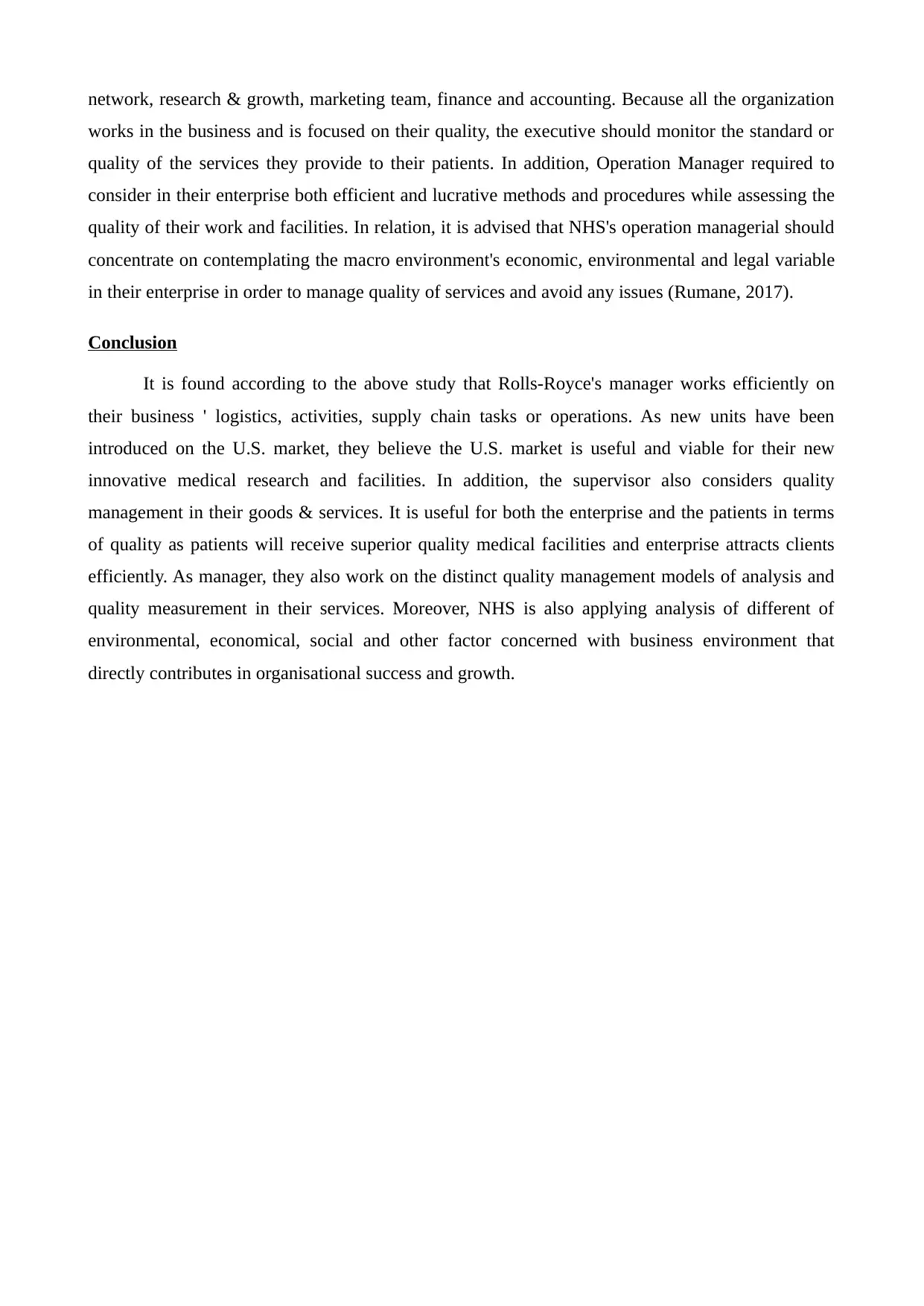
network, research & growth, marketing team, finance and accounting. Because all the organization
works in the business and is focused on their quality, the executive should monitor the standard or
quality of the services they provide to their patients. In addition, Operation Manager required to
consider in their enterprise both efficient and lucrative methods and procedures while assessing the
quality of their work and facilities. In relation, it is advised that NHS's operation managerial should
concentrate on contemplating the macro environment's economic, environmental and legal variable
in their enterprise in order to manage quality of services and avoid any issues (Rumane, 2017).
Conclusion
It is found according to the above study that Rolls-Royce's manager works efficiently on
their business ' logistics, activities, supply chain tasks or operations. As new units have been
introduced on the U.S. market, they believe the U.S. market is useful and viable for their new
innovative medical research and facilities. In addition, the supervisor also considers quality
management in their goods & services. It is useful for both the enterprise and the patients in terms
of quality as patients will receive superior quality medical facilities and enterprise attracts clients
efficiently. As manager, they also work on the distinct quality management models of analysis and
quality measurement in their services. Moreover, NHS is also applying analysis of different of
environmental, economical, social and other factor concerned with business environment that
directly contributes in organisational success and growth.
works in the business and is focused on their quality, the executive should monitor the standard or
quality of the services they provide to their patients. In addition, Operation Manager required to
consider in their enterprise both efficient and lucrative methods and procedures while assessing the
quality of their work and facilities. In relation, it is advised that NHS's operation managerial should
concentrate on contemplating the macro environment's economic, environmental and legal variable
in their enterprise in order to manage quality of services and avoid any issues (Rumane, 2017).
Conclusion
It is found according to the above study that Rolls-Royce's manager works efficiently on
their business ' logistics, activities, supply chain tasks or operations. As new units have been
introduced on the U.S. market, they believe the U.S. market is useful and viable for their new
innovative medical research and facilities. In addition, the supervisor also considers quality
management in their goods & services. It is useful for both the enterprise and the patients in terms
of quality as patients will receive superior quality medical facilities and enterprise attracts clients
efficiently. As manager, they also work on the distinct quality management models of analysis and
quality measurement in their services. Moreover, NHS is also applying analysis of different of
environmental, economical, social and other factor concerned with business environment that
directly contributes in organisational success and growth.
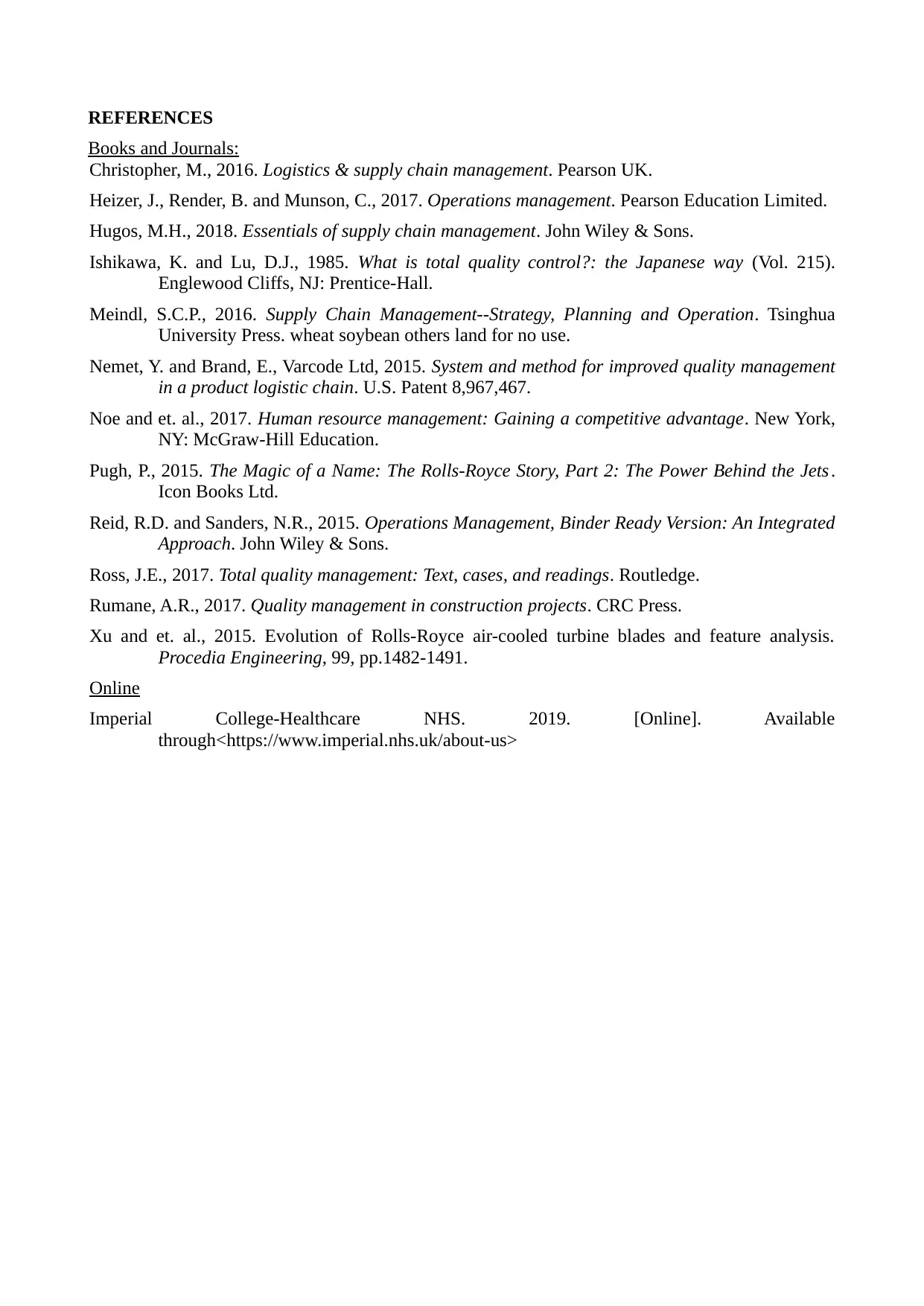
REFERENCES
Books and Journals:
Christopher, M., 2016. Logistics & supply chain management. Pearson UK.
Heizer, J., Render, B. and Munson, C., 2017. Operations management. Pearson Education Limited.
Hugos, M.H., 2018. Essentials of supply chain management. John Wiley & Sons.
Ishikawa, K. and Lu, D.J., 1985. What is total quality control?: the Japanese way (Vol. 215).
Englewood Cliffs, NJ: Prentice-Hall.
Meindl, S.C.P., 2016. Supply Chain Management--Strategy, Planning and Operation. Tsinghua
University Press. wheat soybean others land for no use.
Nemet, Y. and Brand, E., Varcode Ltd, 2015. System and method for improved quality management
in a product logistic chain. U.S. Patent 8,967,467.
Noe and et. al., 2017. Human resource management: Gaining a competitive advantage. New York,
NY: McGraw-Hill Education.
Pugh, P., 2015. The Magic of a Name: The Rolls-Royce Story, Part 2: The Power Behind the Jets .
Icon Books Ltd.
Reid, R.D. and Sanders, N.R., 2015. Operations Management, Binder Ready Version: An Integrated
Approach. John Wiley & Sons.
Ross, J.E., 2017. Total quality management: Text, cases, and readings. Routledge.
Rumane, A.R., 2017. Quality management in construction projects. CRC Press.
Xu and et. al., 2015. Evolution of Rolls-Royce air-cooled turbine blades and feature analysis.
Procedia Engineering, 99, pp.1482-1491.
Online
Imperial College-Healthcare NHS. 2019. [Online]. Available
through<https://www.imperial.nhs.uk/about-us>
Books and Journals:
Christopher, M., 2016. Logistics & supply chain management. Pearson UK.
Heizer, J., Render, B. and Munson, C., 2017. Operations management. Pearson Education Limited.
Hugos, M.H., 2018. Essentials of supply chain management. John Wiley & Sons.
Ishikawa, K. and Lu, D.J., 1985. What is total quality control?: the Japanese way (Vol. 215).
Englewood Cliffs, NJ: Prentice-Hall.
Meindl, S.C.P., 2016. Supply Chain Management--Strategy, Planning and Operation. Tsinghua
University Press. wheat soybean others land for no use.
Nemet, Y. and Brand, E., Varcode Ltd, 2015. System and method for improved quality management
in a product logistic chain. U.S. Patent 8,967,467.
Noe and et. al., 2017. Human resource management: Gaining a competitive advantage. New York,
NY: McGraw-Hill Education.
Pugh, P., 2015. The Magic of a Name: The Rolls-Royce Story, Part 2: The Power Behind the Jets .
Icon Books Ltd.
Reid, R.D. and Sanders, N.R., 2015. Operations Management, Binder Ready Version: An Integrated
Approach. John Wiley & Sons.
Ross, J.E., 2017. Total quality management: Text, cases, and readings. Routledge.
Rumane, A.R., 2017. Quality management in construction projects. CRC Press.
Xu and et. al., 2015. Evolution of Rolls-Royce air-cooled turbine blades and feature analysis.
Procedia Engineering, 99, pp.1482-1491.
Online
Imperial College-Healthcare NHS. 2019. [Online]. Available
through<https://www.imperial.nhs.uk/about-us>
⊘ This is a preview!⊘
Do you want full access?
Subscribe today to unlock all pages.

Trusted by 1+ million students worldwide
1 out of 9
Related Documents
Your All-in-One AI-Powered Toolkit for Academic Success.
+13062052269
info@desklib.com
Available 24*7 on WhatsApp / Email
![[object Object]](/_next/static/media/star-bottom.7253800d.svg)
Unlock your academic potential
Copyright © 2020–2026 A2Z Services. All Rights Reserved. Developed and managed by ZUCOL.




